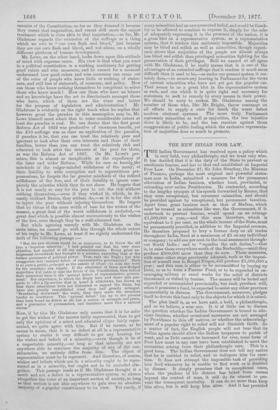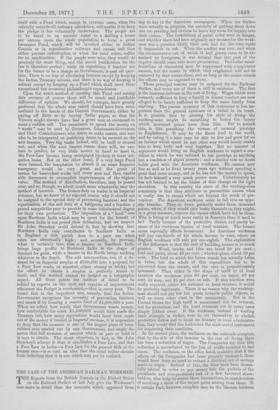THE NEW INDIAN POOR LAW. T HE Indian Government has resolved
upon a policy which is very bold, very philanthropic, and we 'trust very wise. It has decided that it is the duty of the State to prevent or ameliorate famine, and has to that end established an Imperial Poor Law. On December 27, Sir John Strachey, the Minister of Finance, perhaps the most original and powerful states- man now in India, submitted a measure for the permanent alleviation of Indian famines, whether local, provincial, or extending over entire Presidencies. He contended, according to the lengthy synopsis of his speech forwarded by Reuter, that they were exceptional, but recurrent calamities, and should be provided against by exceptional, but permanent taxation. Apart from great famines such as that of Madras, which must be treated as calamities like war, the Government, if it undertook to prevent famine, would spend on an average £1,500,000 a year,—and this sum therefore, which is equivalent to 3 per cent. on the whole income of the State,must be permanently provided, in addition to the Imperial revenue, He therefore proposed to levy a licence duty on all trades throughout India, fixed at a maximum of £1 on any individual or company; to add one per cent. to the local assessment through- out North India ; and to " equalise the salt duties,"—that is, to raise them everywhere south of the Nerbudda,—until they produce £300,000 more than they do now. These measures, with some other steps previously adopted, such as the imposi- tion of a small cess in Bengal Proper,will produce £1,500,000 a year; and this sum is either to be accumulated by buying up Debt, so as to form a Famine Fund, or to be expended in en- couraging railway or canal works for the relief of districts threatened or visited by famine. The money will be levied and expended or accumulated provincially, but each province will, when it possesses a fund, be expected to assist any other province momentarily in distress. The Government, moreover, pledges itself to devote this fund only to the objects for which it is raised.
The plan itself is, as we have said, a bold, a philanthropic, and as we believe, a wise one. It is of little use to discuss the question whether the Indian Government is bound to alle- viate famines, whether occasional massacres are not arranged by Providence to thin off natives, or whether the acknowledg- ment of a popular right to relief will not diminish thrift. As a matter of fact, the English people will not bear that its Indian agents should allow the Indian taxpayers to perish of want, and as Debt cannot be increased for ever, some form of Poor Law must in any case have been established to meet the necessities arising from their philanthropic care. This is a good form. The Indian Government does not tell any native that ho is entitled to relief, and so indispose him for exer- tion. It does not attempt the impossible task of providing him food whenever he is unable to find work or is disabled by disease. It simply promises that in exceptional cases, when the produce of his district has failed from causes beyond the control of man, it will do its utmost to pre- vent the consequent mortality. It can do no more than keep him alive, but it will keep him alive. And it has provided itself with a Fund which, except in extreme cases, when the calamity exceeds all ordinary calculation, will enable it to keep the pledge it has voluntarily undertaken. The people are to be taxed to an amount equal to a shilling a house per annum upon the whole population, to form a great Insurance Fund, which will be invested either in Indian Consols or in reproductive railways and canals, and thus either prevent catastrophes, or when the need arises, suffice for its amelioration. If the people were wise, they would do precisely the same thing, and the moral justification for the law is therefore perfect ; while its expediency if famines are for the future to be a charge on Government, is past all ques- tion. There is no way of alleviating famines except by keeping the Indian Treasury solvent, and there is no way of keeping it solvent except by heaping up a Fund which shall meet these exceptional but recurrent philanthropic expenditures.
Upon the exact method of creating this Fund and raising this revenue of course there will be much and justifiable difference of opinion. We should, for example, have greatly preferred that the whole sum raised should have been accu- mulated in the hands of the Central Government, either by paying off Debt or by buying India paper, so that the Viceroy might always have had a great sum at command to meet a sudden call. The permission to spend the money on "works" may be used by Governors, Lieutenant-Governors, and Chief Commissioners who desire to make names, and sure also to be interpreted as justifying loans to be secured on the Row income. Very big tanks indeed, will be built or cleared out, and when the next famine comes there will, we ven- ture to predict, be very little money in hand to meet it, the Poor-Law income being mortgaged lip-deep to meet irri- gation loans. But on the other hand, if a very large Fund were formed, the temptation to absorb it on some Imperial emergency would be very great, and the grant of means for benevolent works will every now and then enable able Governors to accomplish improvements of the highest value. The method of distribution, therefore, may be passed over, and so, though, we admit, much more reluctantly, may the method of taxation. The licence duty on trades is an Imperial resource, but we know of no especial reason why it should not be assigned to the special duty of preventing famines; and the equalisation of the salt duty at a halfpenny and a fraction a pound compels the poor to provide in some infinitesimal degree for their own protection. The imposition of a " local" cess upon Northern India which may be spent for the benefit of Southern India is not primd facie defensible, but we suspect Sir John Strachey could defend it, first by showing that Northern India only contributes to Southern India as in England a rich parish does to a poor one when rates are abnormally high ; and secondly, by proving, what is certainly true, that a famine in Southern India brings large profits to Northern India in the shape of demand for grain, while a famine in the North brings nothing whatever to the South. The odd interposition, too, of a de- mand for an Imperial surplus of £500,000 into a proposal for a Poor Law reads, as reported, either clumsy or tricky, but . the effort to obtain a surplus is perfectly sound in itself, and the method cannot be judged on a telegraphic report. All these points are matters of detail to be settled by experts on the spot, and capable of improvement whenever the Budget is overhauled,—that is, every year. The broad fact is the important one, namely, that the Indian Government recognises the necessity of preventing famines, and meets it by forming a reserve fund of £1,500,000 a year. When we reflect how sorely that Government wants money, how comfortable the extra £1,500,000 would have made the Treasury feel, how many reputations would have been made out of the money if treated as Imperial revenue, it is impossible to deny that the measure is one of the largest plans of bene- volence ever carried out by any Government, and amply de- serves that full measure of success which in part at least it is sure to obtain. The worst objection, in fact, to Sir John Strachey's scheme is that it establishes a Poor Law, and that a Poor Law in India—a Poor Law for the poorest fifth of the human race—is so vast an idea that the mind rather shrinks from believing that it is one which may yet be realised.







































 Previous page
Previous page